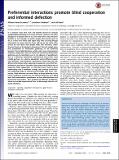Preferential interactions promote blind cooperation and informed defection
Author(s)
Perez Escudero, Alfonso; Friedman, Jonathan; Gore, Jeff
DownloadPerez-Escudero-2016-Preferential interactions.pdf (1.161Mb)
PUBLISHER_POLICY
Publisher Policy
Article is made available in accordance with the publisher's policy and may be subject to US copyright law. Please refer to the publisher's site for terms of use.
Terms of use
Metadata
Show full item recordAbstract
It is common sense that costs and benefits should be carefully weighed before deciding on a course of action. However, we often disapprove of people who do so, even when their actual decision benefits us. For example, we prefer people who directly agree to do us a favor over those who agree only after securing enough information to ensure that the favor will not be too costly. Why should we care about how people make their decisions, rather than just focus on the decisions themselves? Current models show that punishment of information gathering can be beneficial because it forces blind decisions, which under some circumstances enhances cooperation. Here we show that aversion to information gathering can be beneficial even in the absence of punishment, due to a different mechanism: preferential interactions with reliable partners. In a diverse population where different people have different—and unknown—preferences, those who seek additional information before agreeing to cooperate reveal that their preferences are close to the point where they would choose not to cooperate. Blind cooperators are therefore more likely to keep cooperating even if conditions change, and aversion to information gathering helps to interact preferentially with them. Conversely, blind defectors are more likely to keep defecting in the future, leading to a preference for informed defectors over blind ones. Both mechanisms—punishment to force blind decisions and preferential interactions—give qualitatively different predictions, which may enable experimental tests to disentangle them in real-world situations.
Date issued
2016-11Department
Massachusetts Institute of Technology. Department of PhysicsJournal
Proceedings of the National Academy of Sciences
Publisher
National Academy of Sciences (U.S.)
Citation
Pérez-Escudero, Alfonso et al. “Preferential Interactions Promote Blind Cooperation and Informed Defection.” Proceedings of the National Academy of Sciences 113, 49 (November 2016): 13995–14000 © 2016 National Academy of Sciences
Version: Final published version
ISSN
0027-8424
1091-6490